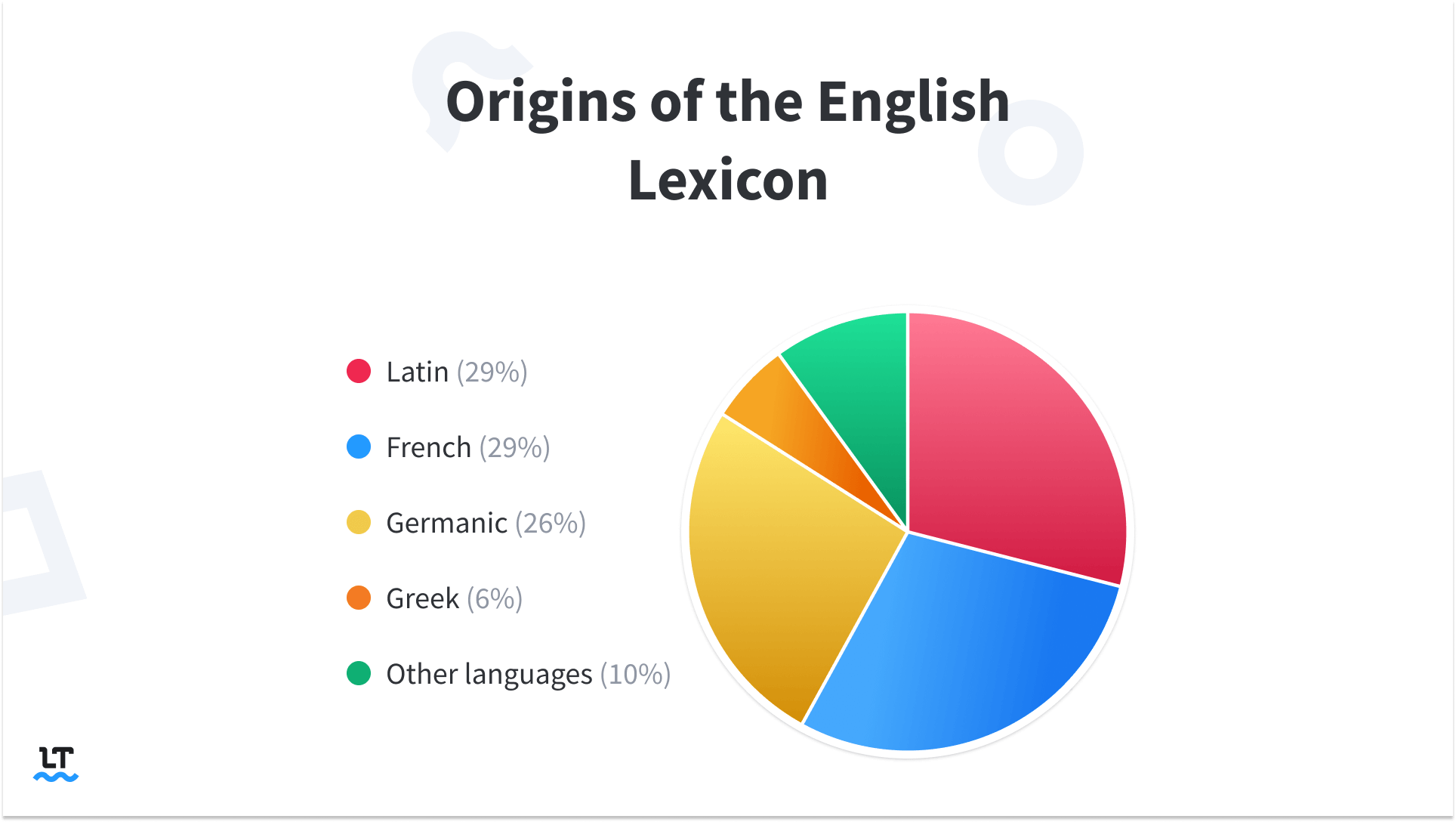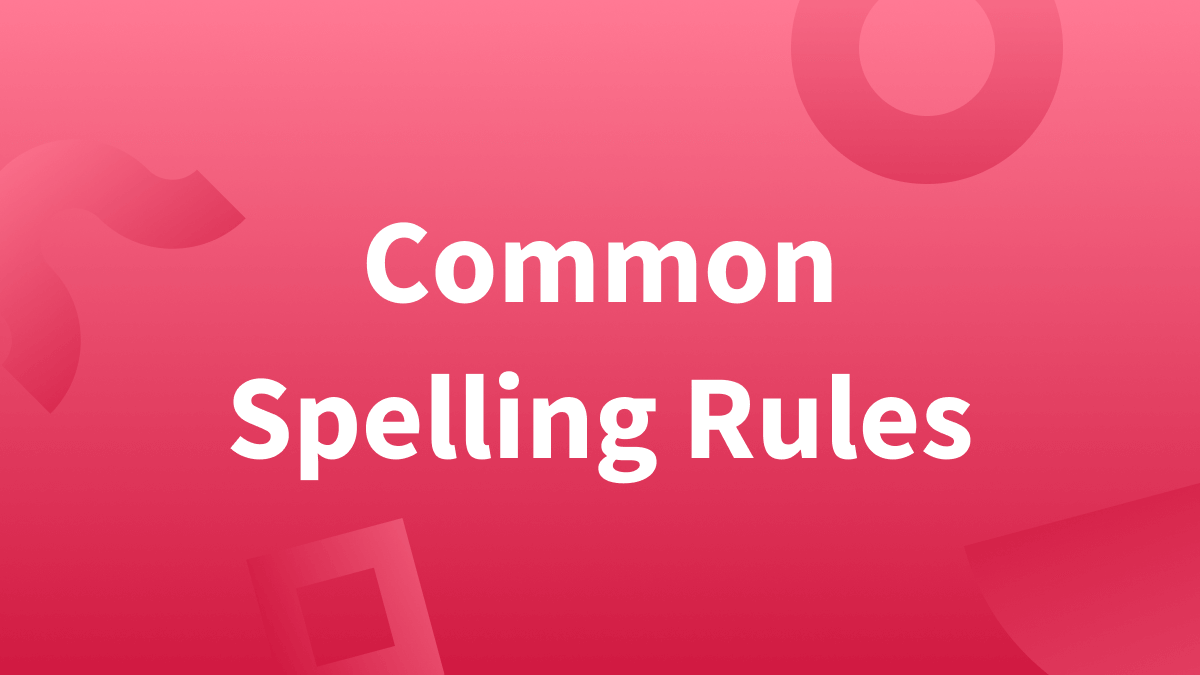Common Spelling Rules
- “I before e except after c” explains that when the letters “i” and “e” appear next to each other, “i” is usually written first, except when immediately after the letter “c.” However, the full rhyme gives just a small glimpse of the wide number of exceptions this rule has.
- The Three-Letter Rule states that most of the time, content words have at least three letters, whereas words with one or two letters are usually function words.
- When adding a suffix to a word, double the final consonant only when the single-syllable word ends with a vowel that precedes the last consonant, or when a word follows this plus has the emphasis on the last syllable.
Origins and Influences of the English Language
Think of Modern English as a brightly colored mosaic—a large artwork formed of smaller pieces put together. The small pieces are the several languages that helped create the English language, such as Latin, Greek, German, and French, to name a few.
The mosaic is beautiful and easy to interpret from afar. But if you get close enough to examine the intricate pieces and rules that hold the language together, you’ll easily get overwhelmed. This is because many of the rules are fluid and work…except when they don’t. What makes this even more confusing is that English language rules differ across regions. What may be the norm in the United States, might not be in Britain, Canada, or Australia. It’s enough to frustrate native speakers and English language learners alike. Below, we’ll examine three of the most common spelling rules and their exceptions.

“I Before E, Except After C”
This rule is one of the first ones taught to those learning the English language, but mostly because it rhymes and is easy to remember, not because it’s immaculate (it’s not). It explains that when the letters “i” and “e” appear next to each other, “i” is written before “e” in most cases, except if the two letters immediately follow the letter “c.”
However, this is a perfect example of a common spelling rule that doesn’t always hold true and has a multitude of exceptions:
Efficient, neither, ancient, foreign, caffeine
This rule can serve as a more accurate guide if you know the full rhyme: “I” before “e,” except after “c,” or when sounding like “a” /eɪ/, as in Neighbor or Weigh.
Freight, eight, sleigh, weight
“The Three-Letter Rule”
Content words (verbs, adjectives, adverbs, and most nouns) communicate meaning, definition, or explanation in the sentence in which they occur. A function word (pronouns, preposition, conjunctions, etc.), on the other hand, performs grammatical functions and helps structure sentences.
The Three-Letter Rule states that most content words have at least three letters, whereas one or two-letter words are mostly function words. This rule is especially helpful when trying to figure out how to spell a single-syllable word or when trying to decide which of two homophones to use.
The main exception to this rule is when be and do are used as main verbs. In that case, they would be considered content words. A few other two-lettered content words are go, no, and up (when used as an adjective).
Doubling a Final Consonant
When adding a suffix to a word, knowing when to double a final consonant or not can be tricky. The rule of thumb is to double the consonant when a single vowel precedes the consonant in a single-syllable word.
Bar → Barred, barring
Hop → Hopped, hopping, hopper
Rob → Robbed, robbing, robber
Stop → Stopped, stopping, stopper, stoppable
The consonant should also be doubled when a two-syllable word ends with a vowel before the consonant and is stressed on the second syllable.
Admit → Admitted, admitting
Forget → Forgettable, forgetting
Omit → Omitted, omitting
There are exceptions, of course. A few of them are:
1) Don’t double a consonant that follows another consonant.
(back = backed, notbackked)
2) Don’t double X or W.
(tax = taxed, nottaxxed)
3) Don’t double consonants after two vowels.
(foul = fouled, notfoulled)
Please Note
It’s imperative to remember that English spelling rules differ across regions. For example, British and American spelling follow different conventions.
Avoiding Common Mistakes in Spelling
These are just three of many common spelling rules. Trying to remember all of them (plus their spelling exceptions) might seem like an impossible feat. That’s why it’s a smart idea to have a writing assistant like LanguageTool that double-checks your writing for spelling and grammar mistakes, suggests stylistic improvements, and helps enhance your texts with powerful synonyms.

